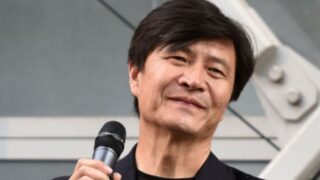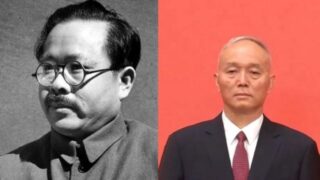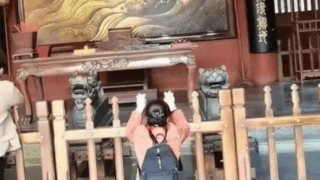A report by the Czech academic center Sinopsis highlights “major donations” by United Front’s “heavyweights” to finance French “influence diplomacy.”
by Massimo Introvigne


A very detailed report published on May 11 by the authoritative Czech project Sinopsis, the result of the cooperation between the NGO AcaMedia and the Department of Sinology at Charles University in Prague, unveils a curious relationship between France’s “cultural and influence diplomacy” and the Chinese Communist Party (CCP). In short, France gets money from the CCP to fund its most important diplomatic project.
To understand what this new major scandal involving France is all about, we need to introduce the main characters of the comedy. The first is the French Ministry of Foreign Affairs, which in December 2021 launched its “Roadmap for Influence.” Through this ambitious project of “cultural and influence diplomacy,” France plans to win what it presents as the real main battle of the 21st century, “the struggle for influence [that] is also a fight between narratives and, ultimately, models.”


The second character is President Macron. He is all in favor of “cultural and influence diplomacy” as an expression of French “grandeur” and a way of exporting the values of “la République” internationally—but he is also painfully aware that his budget is limited, and he leads a country where citizens take to the streets protesting painful cuts in the field of pensions and other social services. So, his message is: go on with this wonderful project but try to find funds from private donors.
The third character, not mentioned in the Czech report but not unimportant, is the MIVILUDES, the French governmental agency combating “cults.” It is under constant criticism by NGOs, academic scholars, and the United States agencies producing reports on religious liberty for its systematic violations of freedom of religion or belief. It needs the French “cultural and influence diplomacy” to support it internationally and persuade other countries that the French anti-cult fight is reasonable. You do not need to take Bitter Winter’s word for this. The MIVILUDES itself explains in its reports that the French position on “cults”—and “separatism,” i.e., the fight, regarded in some Muslim countries as Islamophobic, against communities that want to live “separately” from the values of the majority, based on their religion— is not necessarily appreciated abroad. It adds that France is at work diplomatically to explain its reasons internationally, and persuade other countries to join the anti-cult fight. This is obviously part of French “cultural and influence diplomacy.”
The fourth character is China’s United Front. In theory, the United Front is the alliance between the Chinese Communist Party, eight minor legally permitted parties, and the All-China Federation of Industry and Commerce. In practice, the United Front is the main CCP propaganda agency, which in the words of Xi Jinping himself should try to control “how China is perceived internationally.” Although that the United Front is part and parcel of the CCP is obvious to all those familiar with China, for foreign recipients of donations it is sometimes more elegant to receive money from the United Front than directly from the Communist Party or Beijing’s government. Better still, they receive money from private businesspersons who operate as “almoners” of the United Front.
This leads us to introduce two other characters, who figure prominently in the Czech report: Jonathan Choi Koon-shum (蔡冠深) and Pansy Catalina Ho Chiu-king (何超琼). They are both billionaire businesspersons. Choi is from Hong Kong and is the son of Choi Kai-you, the pro-Chinese “King of Seafood.” Ho is from Macau and is the daughter of Stanley Ho, “the King of Gambling,” rumored, truly or falsely, to be connected with the Chinese mafia. Stanley Ho, who always denied the mafia connections, was a member of China’s National People’s Congress and was on the Standing Committee of the Chinese People’s Political Consultative Conference (CPPCC), the most important United Front forum. There would have been no contradictions between being a United Front leader and connected with the mafia, since the CCP in its history repeatedly cultivated underground alliances with Chinese organized crime.
Jonathan Choi and Pansy Ho have been depicted since the last decade in French media as philanthropists in love with French culture and generously supporting French museums and universities, with a coordinated emphasis that betrays the work of public relations agencies. “Le Figaro” called Jonathan Choi a hero and even compared him to a Buddha. No French media, however, explained that both Jonathan Choi and Pansy Ho are members of the Standing Committee of the Chinese People’s Political Consultative Conference (CPPCC). The Czech report lists all their positions in United-Front-related organizations and concludes that they are “United Front heavyweights.” Whether they use their own or United Front’s money to finance French activities is less important than the fact that their “people-to-people diplomacy” (as China calls it) is obviously not a civil society activity but a strategy deployed by and on behalf of the United Front, i.e., of the CCP.


When France launched its “cultural and influence diplomacy,” and looked for private donors to support it, Choi and Ho were there to help. According to the Czech report, “Choi’s known donations amount to more than 2,5 million euros, to which must be added those whose amount has not been disclosed.” Ho has been very careful not to disclose the amounts she donated, but they are also substantial. As major donors, Choi and Ho have direct accept to President Macron and other key French political figures. The Czech report suggests that they influence French political positions on Hong Kong and Taiwan, and operate in general to put brakes on France’s criticism of human rights violations in China.
But the United Front is surely glad to support the diplomatic export of French positions on “cults” as well. French private and governmental anti-cult organizations have cooperated with China since the early years of the persecution of Falun Gong. They would do this even for free, for ideological reasons—but certainly the monetary support from the United Front to French “cultural and influence diplomacy” makes this merry cooperation even merrier.








